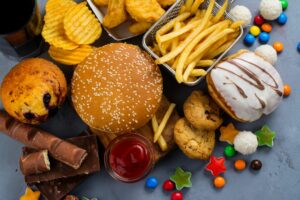Struggling together with your wholesome consuming intentions? Our perspective to meals has change into oh so difficult, however why? Dr Meg Arroll explains
The psychology of meals and consuming behaviour is certainly difficult. Consuming is a behaviour and like all human behaviours it’s removed from easy.
It might appear wise that we really feel hungry, so we eat, however there are various different elements which are concerned within the meals that we select to eat, together with:
- well being
- temper
- comfort
- sensory attraction
- pure content material
- value
- weight management
- familiarity
- moral concern
#1 Around the clock meals availability – a contemporary dilemma
The sheer availability of food and drinks makes it more durable to eat inside our wants as a result of we’re evolutionarily wired to hunt out energy-dense sources of vitamin.
We reside in a 24-hour society – not solely are retailers open late, however there are additionally apps that ship take-aways at a contact of a button, all through each day and night time.
A research in mice provides us some clues as to why our trendy existence make consuming so difficult.
In a lab, mice that ate at any time when they favored (day and night time) gained extra weight than those who might solely eat throughout an 8-hour window, displaying that it was not the kind of meals that made one group achieve a major quantity extra weight (28% actually) however the disruption in regular consuming patterns.
physiologically our default is to worry lack of meals
Fasting diets are very talked-about now, however the sheer availability of meals is in contrast to something we’ve ever skilled in human historical past.
Though we reside in a technologically advanced world, physiologically our default is to worry lack of meals (famine) so the urge to feast is all the time with us.
Meals are engineered to faucet into this primitive drive, particularly designed to achieve a ‘bliss level’ that triggers the reward centres within the human mind.
These meals are extremely processed to be cost-efficient for the producer, however normally, they’re nutrient-poor.

#2 Advertising and marketing vs brainwashing
Many tens of millions of kilos are spent yearly to set off our associations between meals and our emotions, in order that we attain for them zombie-like regularly.
It’s not troublesome to think about adverts wherein meals is coupled with attractiveness, aspiration and even intercourse. These photos then elicit emotions of indulgence, naughtiness and sensuality.
photos then elicit emotions of indulgence
Social anthropologists theorise that meals is related to intercourse as they’re each organic requirements for survival. That is yet one more issue that complicates our relationship with meals, which has resulted in much more confusion relating to what’s, and what isn’t, a nutritious diet.
So, if we layer this on prime of our already complicated image our societal norms and expectations round physique picture, is it any shock that consuming has change into so difficult?

#3 Simple to eat junk meals
Given the issues talked about above, it’s not shocking that we might be tempted by meals that increase our waistlines.
If we take ‘junk meals’ for example, akin to excessive processed gadgets like biscuits and crisps are comparatively low-cost and an amazing deal extra handy than rustling up selfmade meals from natural, farm-fresh produce.
excessive processed gadgets like biscuits and crisps are comparatively low-cost
These typically have shiny packaging that jumps out from the aisles and is focused at particular teams by way of the look and textual content on wrappers.
These meals could also be extra acquainted to you additionally if that is what you grew up with.

#4 Meals as a reward
Moreover, temper and meals have a detailed relationship, so if a biscuit or candy was provided after a scraped knee as a toddler, there may be an affiliation between these meals and luxury.
For some individuals, whether or not meals is pure and moral can play an element in alternative additionally. Therefore, what at first looks as if a quite simple on a regular basis exercise by way of meals alternative, is definitely way more complicated than at first look.
sustenance is linked with consolation and security
The consumption, preparation and sharing of meals are all delicately intertwined with our feelings, relationships and tradition – and these are among the explanation why consuming habits might be so laborious to interrupt.
From the second we’re born, sustenance is linked with consolation and security – so it’s little surprise that we flip to meals after we’re feeling down, confused or insecure.
Kids are likely to eat what their mother and father eat, therefore if mother and father’ snacks and treats are crisps, chocolate and pastries then these are the sorts of meals children may even select.

#5 Childhood lays the foundations
However why is it that as full-grown adults we nonetheless fall again on the foodstuff of our childhood?
We might imagine that as tax-paying grown-ups we must always be capable to have extra management on our meals selections, however research present that how we eat as youngsters trickle by adolescence, then maturity, and change into our private consuming habits.
we frequently eat on autopilot and comply with baby and adolescent meals habits
This, partly, may very well be resulting from publicity – it’s laborious to develop a style for meals you’ve by no means had the chance to strive.
Certainly, there’s a direct relationship between the variety of instances youngsters are offered with foodstuffs and their liking for it – the larger the publicity, the larger the choice for a sure meals.
For this reason consuming behaviours from childhood persist – we frequently eat on autopilot and comply with baby and adolescent meals habits with little acutely aware consciousness.

Dr Meg Arroll is a Chartered Psychology and works with wellbeing and complement model Healthspan.
Dr Meg has a particular curiosity in well being and behavior change and has written plenty of well being books and sees non-public purchasers at www.drmegarroll.com
Extra Healthista Content material:
5 shocking issues you possibly can deal with with Botox
Greatest weight loss plan for menopause – an interview with Dr Clare Bailey
Office overwhelm? Psychologist reveals methods to discover the right work/life stability
Kids’s psychological well being – baby psychotherapist reveals key indicators to look out for
Contact lenses: professional reveals 5 key guidelines
